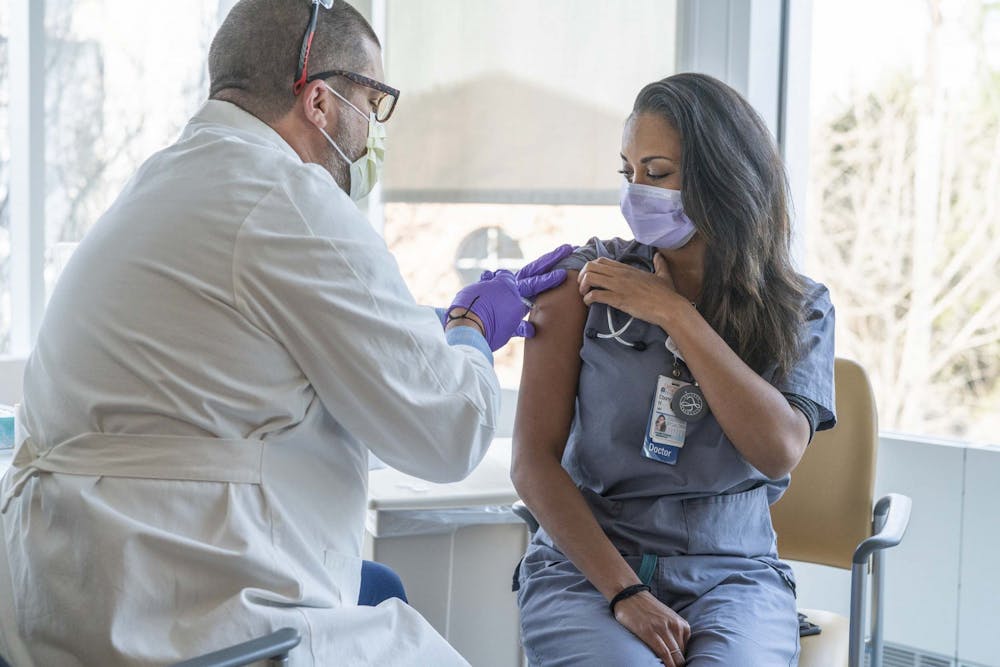The U.Va. Health System received around 3,000 doses of the Pfizer COVID-19 vaccine Tuesday morning, according to an internal email sent to the Health System. The first vaccine was administered Tuesday afternoon to Dr. Ebony Hilton, an associate professor of anesthesiology in the School of Medicine, and then to doctors, nurses, environmental science workers and pharmacists at high-risk of contracting the disease while working.
“I feel absolutely great,” Hilton said about six hours after receiving the vaccine. “No symptoms, no pain, no fever, no muscle aches, no nothing.” Hilton reported minor soreness in her shoulder Wednesday morning, but clarified that it felt no different than an average shot.
A second dose of the vaccine is scheduled to be administered approximately 21 days after receiving the first dose. According to this timeline, the first members of the community to receive the vaccine will be finished with the vaccination process by Jan. 5. The Pfizer vaccine is about 95 percent effective at protecting against symptomatic COVID-19 and has no major side effects.
The internal email to employees requested that those opting to receive the vaccine commit to receiving both doses, as receiving only one dose does not protect against COVID-19.
According to CDC guidelines, healthcare workers and nursing home residents will receive the first wave of vaccines, with those who work directly with COVID-19 patients receiving the first doses. Residents of long-term care facilities will receive vaccines from private companies like CVS and Walgreens.
Kathryn Goodman, communications and public relations manager at Thomas Jefferson Health District, says that U.Va. Health System and Thomas Jefferson Health District will collaborate on providing vaccinations for the community, given that the district includes the City of Charlottesville.
“We will likely collaborate on community vaccine dispensing and are still working on those plans as we do not have a set timeline for when the vaccine will be available for the general public,” Goodman said in an email to The Cavalier Daily.
According to a timeline estimated by Business Insider, vaccines are expected to become more widely available for young, healthy members of the public by May or June 2021.
The email from the Health System noted that as vaccine supplies expand over the next 12 months, they anticipate offering COVID-19 vaccinations to the entire U.Va. Health team. Therefore, Health System workers who do not opt to get the vaccine within the first shipment of doses will be able to receive it in the future.
The timeline for when the U.Va. community – including students, faculty and workers – will be vaccinated is still unclear. Eric Swensen, public information officer at the U.Va. Health System, said the Health System will work with other local organizations such as pharmacies to provide the vaccine to the University community. It is still unclear when students will be able to receive the vaccine.
“Planning for vaccine allocation and distribution is being led by the Centers for Disease Control on the federal level and by the Virginia Department of Health in Virginia,” Swenson said in an email to The Cavalier Daily. “The logistical effort to distribute the vaccines will be significant, and we anticipate it will involve multiple groups, including area hospitals, pharmacies and the Thomas Jefferson Health District.”
The doses received by U.Va. Health in the future will be provided only to people residing in the Charlottesville area. U.Va. Health had to purchase two deep freezers in order to store the vaccine, which must be kept at extremely cold temperatures.
Both the Moderna and Pfizer COVID-19 vaccines require two doses, three weeks apart. The vaccines, which have both been developed in roughly nine months, are 94.1 and 95 percent effective, respectively.
Gov. Ralph Northam, D-Va., announced on Dec. 2 that Virginia will receive about 70,000 doses of the Pfizer vaccine, which was authorized by the FDA on Dec. 12, by mid-December.
The FDA Emergency Use Authorization for the Pfizer vaccine is expected to be granted later this week. The Moderna vaccine is expected to be reviewed next week.
The United Kingdom has already approved the Pfizer vaccine and has begun administering the first doses of the vaccine to residents of nursing homes and healthcare workers. According to the BBC, the United Kingdom is expected to have 4,000,000 doses of the Pfizer vaccine by the end of the year.
In the meantime, public health officials encourage people to continue to wear a mask, stay home if possible and wash their hands frequently.







